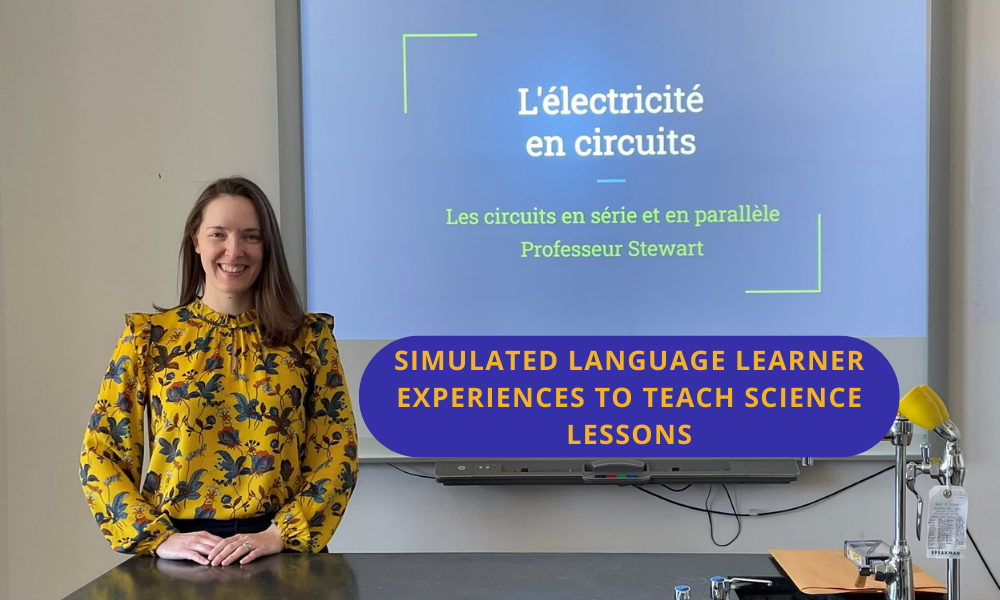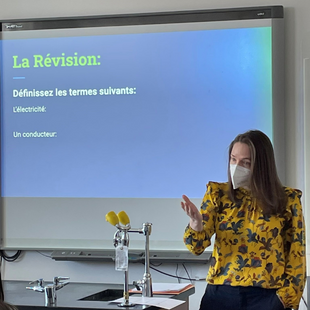Developing a Simulated Language Learner Experience to Teach Science Lessons
By Dr. Angela Webb
College of Education
SUMMARY: Most university students preparing to be teachers likely have limited personal knowledge of being language learners themselves or lack personal or professional experience engaging with multilingual learners (MLLs); yet, MLLs are a fast-growing population in today’s K-12 public schools.

Most university students preparing to be teachers likely have limited personal knowledge of being language learners themselves or lack personal or professional experience engaging with multilingual learners (MLLs); yet, MLLs are a fast-growing population in today’s K-12 public schools. Research (e.g., Banilower et al., 2018) and my own experiences as a science teacher educator highlight that even though preservice teachers receive instruction (e.g., readings, class discussion, assignments) on teaching science to MLLs, they may feel anxious and underprepared to teach science to MLLs or struggle to apply strategies and scaffolds to support MLLs in their instruction.
|
“I recognized the French [in the first lesson] but I only know how to say ‘hi’ so I was super checked out and confused. I could understand the lesson was about electricity and circuits due to cognates but nothing really past that. I started doodling.” -Student impression of the lessons |
To address this, I collaborated with colleagues at my previous institution to develop a simulated language learner experience consisting of two brief science lessons. Through this simulated language learner experience, we endeavored to not only demonstrate and facilitate discussion of specific supports for language learners in science, but also to foster an understanding and appreciation of the unique learning experiences of MLLs in science. To accomplish this, the preservice teachers were put—unbeknownst to them at the onset and albeit for only a short time—into the role of language learners during two brief, back-to-back science lessons on series and parallel circuits. Both demonstration lessons in the simulated language learner experience were taught in French: Lesson 1 lacked strategies and scaffolds for language learners; Lesson 2 incorporated research-based supports for language learners in science (see Lee & Buxton, 2013).
|
“[This was a] nice reminder of what MLLs experience on a daily [basis]. I also could see what was helpful for students to relate and associate in order to create sensemaking.” -What preservice teacher gained from participating |
Emily Stewart (MSME) and I have collaborated to bring the simulated language learner experience to students in my middle school science methods class (MSSE 470S). The purpose of the simulated language learner experience, and our research on it, is to build preservice science teachers’ empathy for the language demands faced by multilingual learners in today’s science classroom by (a) putting the preservice teacher in the position of a language learner during a set of brief science lessons and (b) demonstrating practices and scaffolds that support the science learning of multilingual students. We hope to learn whether and in what ways being positioned as a language learner, albeit briefly, affects preservice teachers’ perspectives on teaching science to MLLs.
-Banilower, E. R., Smith, P. S., Malzahn, K. A., Plumley, C. L., Gordon, E. M., & Hayes, M. L. (2018). Report of the 2018 national survey of science and mathematics education. Chapel Hill, NC: Horizon Research, Inc.
-Lee, O., & Buxton, C. A. (2013). Teacher professional development to improve science and literacy achievement of English language learners. Theory Into Practice, 52, 110-117.
My previous publications on the simulated language learner experience:
-Barrera, E. S., IV, & Webb, A. W. (2018). Making a way for Latin@ ELLs to engage in STEM: Transforming teacher preparation through a simulated language learning experience. In T.T. Yuen, E. Bonner, M.G. Arreguín-Anderson (Eds.), (Under)represented Latin@s in STEM: Increasing participation throughout education and the workplace (pp. 49-62). New York, NY: Peter Lang.
-Webb, A. W., & Barrera, E. S., IV. (2017). Providing equal opportunity to learn science for English language learners: The role of simulated language learner experiences in teacher preparation. Catalyst: A Social Justice Forum, 7, 16-23. https://trace.tennessee.edu/catalyst/vol7/iss1/3
-Webb, A. W., Barrera, E. S., IV, & Calderon, P. S. (2014). Teaching responsively: Developing an awareness of responsibility to English language learners in pre-service elementary science teachers. eJournal of Literacy and Social Responsibility, 7(1), 20-36.
